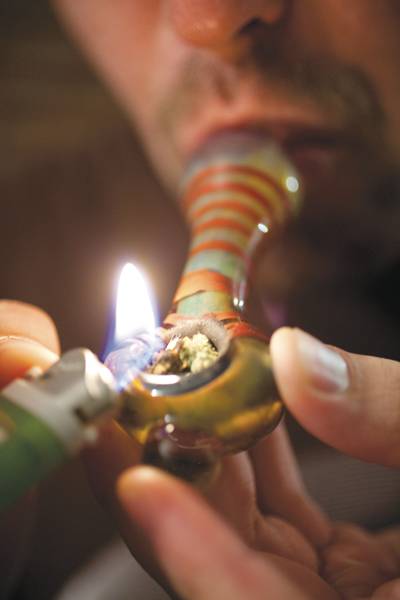Heckle: War on marijuana limits progress in United States

A resident lights a bowl of marijuanna in one of the residence halls. Pot is the most commonly used illegal drug that people are cited for in residence halls. Photo: Rashah McChesney/Iowa State Daily
April 21, 2016
In March of 2009, newly elected President Barack Obama organized an interactive online town hall meeting where the public was encouraged to vote and submit questions for the new leader. The single most popular question of the night was on the legalization of marijuana. The question, which received 3 million votes, was as follows: “With over 1 out of 30 Americans controlled by the penal system, why not legalize, control, and tax marijuana to change the failed war on drugs into a money making, money saving boost to the economy? Do we really need that many victimless criminals?”
Despite the questions enormous popularity, the young president laughed it off, responding that he did not believe that marijuana was the route to building our economy. While Obama is well within in his rights to disagree with the sentiment, his position became more ambiguous as his time in office continued. His attitude toward the question seems to represent the reaction of many to marijuana legalization.
Since the beginning of marijuana prohibition, there have been those who have called out the flaws and contradictions of such legislation. Yet, the issue of marijuana legalization is often portrayed as one perpetuated by left-wing stoners and those who are missing the “big issues” in the United States. But cannabis legalization is no laughing matter.
Since the implementation of the Controlled Substances Act in 1972, 16.5 million Americans have been arrested for marijuana-related offenses, and prohibition cost tax payers $20 billion a year. The issue of marijuana legalization is no longer an exclusive calling card for pot smokers and liberal elitist. It is a real issue that threatens the personal freedom of all Americans.
I have already written extensively on the history of and arguments against cannabis prohibition in my series titled “The Road to Legalization,” therefore I won’t bore you by repeating myself. But one point I failed to drive home is the urgency and importance of such legalization. Our country continues to fight a failed war on drugs that cost tax payers $15 billion in federal funds in the last six years alone. State and local government spent an additional $25 billion last year. All and all, Americans spend about $500 a second on drug enforcement.
But what are we enforcing? Nearly 40 percent of Americans have admitted to trying cannabis at least once in their life. That means 94 million Americans should be considered criminals, according to the law. The insanity of that sentiment should be extremely clear. Furthermore, half of all drug busts are marijuana related, with the majority of those being for possession in small amounts — under one once in most cases. In essence, our government is spending the better half of $20 billion to stop individuals from possessing and using small amounts of plant matter and, in the process, affecting the lives of millions of otherwise innocent Americans.
This is all done in the name of public safety. As we’ve all heard from Nancy Reagan and D.A.R.E, drugs are bad. But is it the government’s job to tell us what substances can or can’t enter our bodies? A total of 480,000 Americans die each year from tobacco use, and more than 16 million live with a disease caused by tobacco. Another 88,000 die from alcohol-related incidents each year, and almost half of deaths from liver disease and cirrhosis can be attributed to alcohol. If the government is really so concerned about public safety, then why is the leading cause of preventable death, tobacco, and the fourth runner-up, alcohol, still legal in the United States?
As you have probably heard by now, there is no record of anyone dying from marijuana consumption. As a result, the already laughable argument that pot is illegal because the government cares for our health is somewhat null and void. If we continue this already failed war on marijuana, we will continue to cost American tax payers billions of dollars a year, enforcing the restriction of a plant whose main reason for being prohibited is, essentially, because the government says so.















